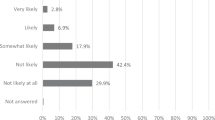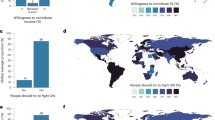Abstract
Public engagement with climate change is critical for maintaining the impetus for meaningful emissions cuts. Ocean acidification (OA) is increasingly recognized by marine scientists as an important, but often overlooked, consequence of anthropogenic emissions1,2. Although substantial evidence now exists concerning people’s understanding of climate change more generally3, very little is known about public perceptions of OA. Here, for the first time, we characterize in detail people’s understanding of this topic using survey data obtained in Great Britain (n = 2,501) during 2013 and 2014. We draw on theories of risk perception and consider how personal values influence attitudes towards OA. We find that public awareness of OA is very low compared to that of climate change, and was unaffected by the publication of the IPCC Fifth Assessment Report. Using an experimental approach, we show that providing basic information can heighten concern about OA, however, we find that attitude polarization along value-based lines may occur if the topic is explicitly associated with climate change. We discuss the implications of our findings for public engagement with OA, and the importance of learning lessons from communications research relating to climate change.
This is a preview of subscription content, access via your institution
Access options
Subscribe to this journal
Receive 12 print issues and online access
$209.00 per year
only $17.42 per issue
Buy this article
- Purchase on Springer Link
- Instant access to full article PDF
Prices may be subject to local taxes which are calculated during checkout


Similar content being viewed by others
References
Nagelkerken, I. & Connell, S. D. Global alteration of ocean ecosystem functioning due to increasing human CO2 emissions. Proc. Natl Acad. Sci. USA 112, 13272–13277 (2015).
Gattuso, J.-P. et al. Contrasting futures for ocean and society from different anthropogenic CO2 emissions scenarios. Science 349, aac4722 (2015).
Clayton, S. et al. Psychological research and global climate change. Nature Clim. Change 5, 640–646 (2015).
Pidgeon, N. F. & Fischhoff, B. The role of social and decision sciences in communicating uncertain climate risks. Nature Clim. Change 1, 35–41 (2011).
Watson, A. J. et al. Tracking the variable North Atlantic sink for atmospheric CO2 . Science 326, 1391–1393 (2009).
Bates, N. R. et al. A time-series view of changing ocean chemistry due to ocean uptake of anthropogenic CO2 and ocean acidification. Oceanography 27, 126–141 (2014).
Wittmann, A. C. & Pörtner, H. O. Sensitivities of extant animal taxa to ocean acidification. Nature Clim. Change 3, 995–1001 (2013).
Turley, C. & Gattuso, J.-P. Future biological and ecosystem impacts of ocean acidification and their socioeconomic-policy implications. Curr. Opin. Environ. Sustain. 4, 278–286 (2012).
Pidgeon, N. F. & Rogers-Hayden, T. Opening up nanotechnology dialogue with the publics: risk communication or ‘upstream engagement’? Health Risk Soc. 9, 191–210 (2007).
Gelcich, S. et al. Public awareness, concerns, and priorities about anthropogenic impacts on marine environments. Proc. Natl Acad. Sci. USA 111, 15042–15047 (2014).
Chilvers, J. et al. Public engagement with marine climate change issues: (re)framings, understandings and responses. Glob. Environ. Change 29, 165–179 (2014).
Frisch, L. C., Mathis, J. T., Kettle, N. P. & Trainor, S. F. Gauging perceptions of ocean acidification in Alaska. Mar. Policy 53, 101–110 (2015).
Lee, T. M., Markowitz, E. M., Howe, P. D., Ko, C. Y. & Leiserowitz, A. A. Predictors of public climate change awareness and risk perception around the world. Nature Clim. Change 5, 1014–1020 (2015).
Smith, N. & Leiserowitz, A. A. The rise of global warming skepticism: exploring affective image associations in the United States over time. Risk Anal. 32, 1021–1032 (2012).
Slovic, P., Finucane, M. L., Peters, E. & MacGregor, D. G. The affect heuristic. Eur. J. Oper. Res. 177, 1333–1352 (2007).
Tvinnereim, E. & Fløttum, K. Explaining topic prevalence in answers to open-ended survey questions about climate change. Nature Clim. Change 5, 744–747 (2015).
Spence, A., Poortinga, W., Butler, C. & Pidgeon, N. F. Perceptions of climate change and willingness to save energy related to flood experience. Nature Clim. Change 1, 46–49 (2011).
Dunlap, R., van Liere, K., Mertig, A. & Jones, R. E. Measuring endorsement of the new ecological paradigm: a revised NEP scale. J. Soc. Issues 56, 425–442 (2000).
van der Linden, S. The social-psychological determinants of climate change risk perceptions: towards a comprehensive model. J. Environ. Psychol. 41, 112–124 (2015).
Xue, W., Hine, D. W., Loi, N. M., Thorsteinsson, E. B. & Phillips, W. J. Cultural worldviews and environmental risk perceptions: a meta-analysis. J. Environ. Psychol. 40, 249–258 (2014).
Poortinga, W., Spence, A., Whitmarsh, L., Capstick, S. B. & Pidgeon, N. F. Uncertain climate: an investigation into public scepticism about anthropogenic climate change. Glob. Environ. Change 21, 1015–1024 (2011).
Kahan, D. M. et al. The polarizing impact of science literacy and numeracy on perceived climate change risks. Nature Clim. Change 2, 732–735 (2012).
Peters, G. J. Y., Ruiter, R. A. & Kok, G. Threatening communication: a critical re-analysis and a revised meta-analytic test of fear appeal theory. Health Psychol. Rev. 7, S8–S31 (2013).
Cooley, S. R., Ono, C. R., Melcer, S. & Roberson, J. Community-level actions that can address ocean acidification. Front. Mar. Sci. 2, 128 (2015).
Bain, P. G. et al. Co-benefits of addressing climate change can motivate action around the world. Nature Clim. Change 6, 154–157 (2016).
Turley, C. & Boot, K. Environmental Consequences of Ocean Acidification: A Threat to Food Security (United Nations Environment Programme, 2010).
Jefferson, R. L., Bailey, I., Richards, J. P. & Attrill, M. J. Public perceptions of the UK marine environment. Mar. Policy 43, 327–337 (2014).
van der Linden, S., Leiserowitz, A. A., Feinberg, G. D. & Maibach, E. W. The scientific consensus on climate change as a gateway belief: experimental evidence. PLoS ONE 10, e0118489 (2015).
Tobler, C., Visschers, V. H. & Siegrist, M. Consumers’ knowledge about climate change. Clim. Change 114, 189–209 (2012).
Painter, J. Nature Clim. Change 5, 286–288 (2015).
Lorenzoni, I., Leiserowitz, A. A., de Franca Doria, M., Poortinga, W. & Pidgeon, N. F. Cross-national comparisons of image associations with ‘global warming’ and ‘climate change’ among laypeople in the United States of America and Great Britain. J. Risk Res. 9, 265–281 (2006).
Leiserowitz, A. A. Climate change risk perception and policy preferences: the role of affect, imagery, and values. Clim. Change 77, 45–72 (2006).
Rippl, S. Cultural theory and risk perception: a proposal for a better measurement. J. Risk Res. 5, 147–165 (2002).
Leiserowitz, A. A., Maibach, E. W., Roser-Renouf, C., Smith, N. & Dawson, E. Climategate, Public Opinion and the Loss of Trust (Yale Project on Climate Change Communication Working Paper, 2010).
Capstick, S. B. & Pidgeon, N. F. Public perception of cold weather events as evidence for and against climate change. Climatic Change 122, 695–708 (2014).
DiStefano, C., Zhu, M. & Mindrila, D. Understanding and using factor scores: considerations for the applied researcher. Pract. Assess. Res. Eval. 14, 1–11 (2009).
Acknowledgements
The research was funded by the UK Ocean Acidification Research Programme (co-funded by the UK Natural Environmental Research Council; Department for the Environment, Food and Rural Affairs; and the Department of Energy and Climate Change). We thank P. Williamson of the University of East Anglia for helpful comments and advice, and E. Roberts for assistance with coding of image associations.
Author information
Authors and Affiliations
Contributions
S.B.C. led the study design, analysis and writing. N.F.P., A.J.C. and E.M.S. contributed to the study design, analysis and writing. P.N.P. contributed to the study design and writing.
Corresponding authors
Ethics declarations
Competing interests
The authors declare no competing financial interests.
Supplementary information
Supplementary Information
Supplementary Information (PDF 325 kb)
Rights and permissions
About this article
Cite this article
Capstick, S., Pidgeon, N., Corner, A. et al. Public understanding in Great Britain of ocean acidification. Nature Clim Change 6, 763–767 (2016). https://doi.org/10.1038/nclimate3005
Received:
Accepted:
Published:
Issue Date:
DOI: https://doi.org/10.1038/nclimate3005
This article is cited by
-
The “value” of values-driven data in identifying Indigenous health and climate change priorities
Climatic Change (2020)
-
Societal causes of, and responses to, ocean acidification
Ambio (2019)
-
What risks matter? Public views about assisted migration and other climate-adaptive reforestation strategies
Climatic Change (2018)
-
Public perceptions of air pollution and climate change: different manifestations, similar causes, and concerns
Climatic Change (2017)



